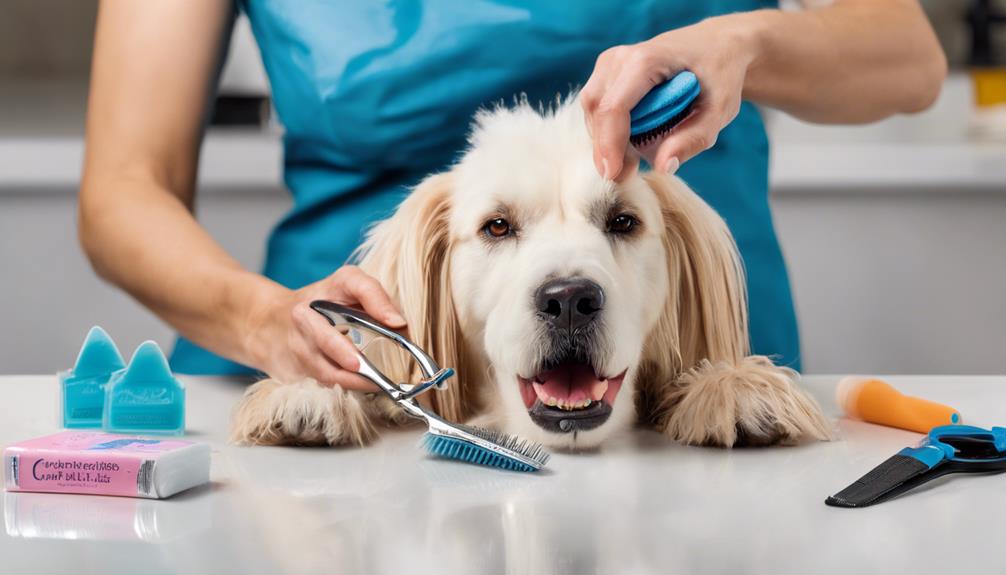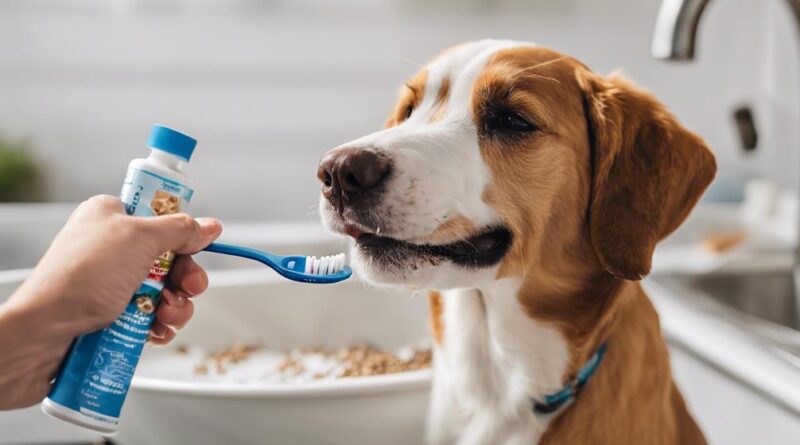12 Essential Tips for Dog Health Issues and Care
So, you think you're a pro at keeping your furry friend healthy, huh? Well, hold on to your leash because we've got some tips that might just surprise you.
From deciphering your dog's behavior to mastering the art of dental care, we've got the inside scoop on how to keep your pup in top-notch shape.
But that's not all – stay tuned for some lesser-known secrets that could make all the difference in your dog's well-being.
Understanding Common Dog Health Issues
To understand common dog health issues, pay attention to signs of discomfort or changes in behavior. Skin conditions and allergies management are prevalent among dogs. If you notice your furry friend excessively scratching, licking, or developing rashes, it could indicate allergies or skin problems. Consult your vet for proper diagnosis and treatment to ensure your dog's comfort.
Digestive issues and dietary sensitivities are also common concerns. Keep an eye out for symptoms like vomiting, diarrhea, bloating, or changes in appetite. These signs could point to underlying digestive problems or dietary intolerances. Adjusting your dog's diet or seeking advice from a vet can help manage these issues effectively.
Importance of Regular Vet Visits
Regular vet visits are crucial for maintaining your dog's health and catching any potential issues early on. These visits play a vital role in ensuring your furry companion lives a long and healthy life. Here are some key reasons why regular vet visits are essential:
- Preventative Care: Regular check-ups with the vet allow for preventative measures to be taken to protect your dog from various illnesses and diseases.
- Annual Check-ups: Yearly visits help monitor your dog's overall health, detect any changes, and address concerns promptly.
- Vaccinations: Vets can ensure your dog is up to date on all necessary vaccinations to prevent serious diseases.
- Early Detection: Regular visits enable early detection of health issues such as dental problems, arthritis, or infections, allowing for timely treatment and management.
Balanced Nutrition for Dogs
Ensuring your dog receives a well-rounded diet is essential for maintaining their overall health and well-being. Meal planning plays a crucial role in providing the necessary nutrients for your furry friend. It's important to offer a balanced mix of proteins, carbohydrates, fats, vitamins, and minerals in their meals. Consider consulting with your veterinarian or a canine nutritionist to create a customized meal plan tailored to your dog's specific needs.
In addition to a balanced diet, nutritional supplements can also be beneficial for your dog's health. These supplements, such as omega-3 fatty acids or glucosamine, can help support your dog's joint health, skin, coat, and overall well-being. However, it's essential to consult with your vet before introducing any supplements to ensure they're safe and appropriate for your dog.
Exercise and Mental Stimulation
For optimal health and happiness in your canine companion, incorporating regular physical activity and mental stimulation into their daily routine is crucial. Here are some tips to help you keep your furry friend active and engaged:
- Playtime activities: Engage in interactive games like fetch, tug-of-war, or hide-and-seek to keep your dog physically active and mentally stimulated.
- Enrichment toys: Provide your dog with puzzle toys or treat-dispensing toys to challenge their mind and prevent boredom.
- Outdoor adventures: Take your dog on walks, hikes, or trips to the dog park to explore new sights and smells, keeping them engaged with the environment.
- Training sessions: Teach your dog new tricks or commands to provide mental stimulation and strengthen your bond through positive reinforcement.
Dental Care Tips for Dogs
To maintain your dog's overall well-being, paying attention to their dental health is essential. Good dental hygiene is crucial for preventing dental issues such as plaque buildup, gum disease, and tooth decay.
Regular tooth brushing with a dog-specific toothbrush and toothpaste is one of the most effective ways to keep your furry friend's teeth clean and healthy. Aim to brush your dog's teeth at least 2-3 times a week to reduce the risk of dental problems.
In addition to tooth brushing, providing your dog with chew toys can also help improve their dental health. Chew toys can help remove plaque and tartar buildup by promoting chewing and saliva production, which naturally cleanses the teeth.
Opt for dental treats that are specially designed to promote good oral health in dogs. These treats can aid in keeping your dog's breath fresh and their teeth strong.
Parasite Prevention and Control
Regularly administering parasite prevention medications to your dog is crucial for maintaining their health and well-being. Prevention is key to keeping your furry friend safe from common parasites. Here are some essential tips for effective parasite prevention and control:
- Flea Prevention: Fleas can cause itching, discomfort, and even transmit diseases. Use flea prevention products recommended by your veterinarian to keep these pesky parasites at bay.
- Tick Control: Ticks aren't only a nuisance but can also spread serious illnesses such as Lyme disease. Regularly check your dog for ticks, especially after outdoor adventures, and consider using tick prevention treatments.
- Regular Veterinary Check-ups: Schedule routine check-ups with your vet to discuss parasite prevention strategies tailored to your dog's specific needs.
- Environmental Management: Keep your dog's living area clean and tidy. Regularly wash bedding, vacuum carpets, and maintain a well-groomed yard to reduce the risk of parasite infestations.
Grooming Essentials for Dogs

Maintaining proper grooming practices for your dog is essential for their overall health and well-being. Regular grooming helps in keeping your dog's coat healthy and free from tangles or mats. To ensure proper coat maintenance, invest in good quality grooming tools like a slicker brush, comb, and nail clippers. Brushing your dog's coat regularly not only helps in removing loose fur but also stimulates blood circulation and distributes natural oils, keeping the coat shiny and healthy.
In addition to coat care, skin health is also crucial. Bathing frequency depends on your dog's breed and activities but typically ranges from once a month to every three months. Use a dog-specific shampoo to prevent skin irritation and maintain the skin's natural balance. Always remember to dry your dog thoroughly after a bath to prevent skin issues.
Monitoring Your Dog's Behavior
Monitoring your dog's behavior is crucial for understanding their overall well-being and addressing any potential issues early on. By paying close attention to how your furry friend behaves, you can ensure they're happy and healthy.
Here are some essential tips to help you monitor your dog's behavior effectively:
- Be Observant: Take note of any behavioral changes such as increased aggression, excessive barking, or sudden withdrawal.
- Track Daily Interactions: Monitor how your dog interacts with family members, strangers, and other animals to spot any unusual patterns.
- Use Positive Reinforcement: Utilize training techniques like rewards and praise to encourage good behavior and discourage negative habits.
- Seek Professional Help: If you notice persistent behavioral changes despite your efforts, consult a veterinarian or a certified dog trainer for guidance.
Frequently Asked Questions
Can Certain Dog Breeds Be More Prone to Specific Health Issues?
Certain dog breeds can indeed be more prone to specific health issues due to genetic factors. Understanding breed predispositions can help you take preventive measures such as choosing the right diet for your furry companion.
How Can I Best Prepare Financially for Unexpected Vet Visits and Medical Expenses for My Dog?
When preparing for unexpected vet visits and medical expenses for your dog, it's crucial to plan your budget wisely. Start by setting up an emergency fund specifically for your pet's healthcare needs.
Consider investing in pet insurance to help cover major costs. Additionally, having a separate savings account dedicated to your furry friend's well-being can provide a financial safety net during challenging times.
Proactive financial planning is key to ensure you can always afford your dog's medical care.
Are There Any Natural Remedies or Supplements That Can Help Improve My Dog's Overall Health?
When looking to improve your dog's overall health, natural remedies can be effective. Incorporating dietary supplements into their routine can provide many benefits. Consider options like fish oil for joint health or probiotics for digestion.
Always consult with your vet to ensure the supplements are safe and appropriate for your furry friend. Remember, a healthy diet and regular exercise are also key components to keeping your dog in top shape.
What Are Some Signs That My Dog May Be Experiencing Stress or Anxiety, and How Can I Help Alleviate It?
If your dog is displaying signs of stress or anxiety, such as excessive barking or destructive behavior, it's important to address the issue promptly.
Canine behavior modification and stress reduction techniques can help alleviate these symptoms. Try creating a calm environment, providing regular exercise, and using relaxation techniques like massage or music therapy.
Consult with a veterinarian for additional support and consider anxiety management strategies tailored to your dog's specific needs.
Is There a Recommended Schedule for Updating My Dog's Vaccinations and Preventative Care Treatments?
When it comes to your dog's health, sticking to a recommended schedule for vaccinations is crucial. Regular updates help protect against various diseases and ensure your furry friend stays healthy.
It's also essential to consider preventative care options to keep costs in check. Discussing alternative, cost-effective solutions with your vet can help you provide the best care for your dog while being mindful of your budget.
Conclusion
Overall, taking care of your dog's health is essential for their well-being.
By understanding common health issues, visiting the vet regularly, providing balanced nutrition, exercise, and mental stimulation, dental care, parasite prevention, grooming, and monitoring their behavior, you can ensure your furry friend stays happy and healthy.
Remember, your dog relies on you for their care, so make sure to prioritize their health and well-being every day.
